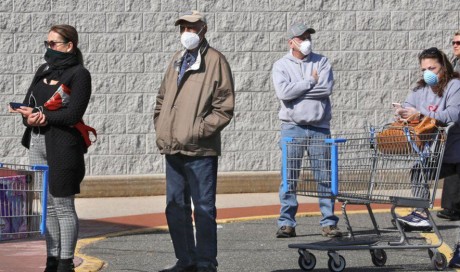The idea that immigrants without legal status are inherently dangerous has driven President Trump's immigration agenda since before he was elected.
At an August campaign speech in Phoenix, he introduced a line of people who described losing loved ones at the hands of immigrants, their T-shirts bearing the words "A Stolen Life."
In January, he ordered the creation of an office to study “the effects of the victimization by criminal aliens present in the United States," calling them "a significant threat."
And in the weeks since, he has pushed widespread deportations as a clear-cut way to reduce crime.
But studies conducted by academics, policy analysts and nonpartisan research groups over the years have failed to substantiate the position that immigrants are more crime-prone than the population at large.
The latest — an analysis of incarceration rates released last week by the libertarian Cato Institute — indicates immigrants are far less likely than native-born U.S. citizens to commit the types of serious crimes the current administration aims to target.
The findings apply to immigrants both with and without legal status, with unauthorized immigrants only slightly more likely to be incarcerated than authorized immigrants once researchers excluded immigration-related offenses.
"Donald Trump has really made this issue particularly relevant ... because he believes that unauthorized immigrants are a major source of crime," Cato policy analyst David Bier told The Arizona Republic. "That does not jibe with any of the evidence that's presented in this report or any other report. (The research) shows they are just not the social deviants they are portrayed to be."
Migrant-rights groups believe the Cato Institute analysis bolsters their arguments for comprehensive immigration reform, rather than sweeping deportations.
Groups that oppose unauthorized immigration, however, called the research a "straw man" that ignores the devastating impact of immigrants who do commit crimes.
What the data shows
The Cato Institute used 2014 census data to evaluate incarceration rates, focusing on male and female prisoners age 18 to 54.
It examined incarceration rates because the rates for unauthorized immigrants had not been "well studied" in the past, according to analysts, and the collection method for inmate data was considered reliable.
Researchers found immigrants without legal status were half as likely to be incarcerated as people born in the U.S., while those with legal status were about one-third as likely to be incarcerated.
The rate for unauthorized immigrants approached that of those with legal status once analysts removed unauthorized immigrants detained or convicted for immigration-related offenses.
When analysts isolated prisoners by racial and ethnic group, immigrants were less likely to be incarcerated than their native-born counterparts in every case.
The results make sense for two reasons, Bier said.
First, criminality is closely tied to unemployment, being unmarried and having no children. Unauthorized immigrants in particular are much more likely to work and to have families, he said, "cultivating behaviors that are associated with being productive members of society versus those associated with criminality."
Second, the incentive not to be caught committing a crime is much stronger for someone who could be deported at any time, Bier said.
"If you're a naturalized citizen or a native-born citizen, you know that you're not going to get your entire life taken away from you for a mistake," he said. "I think that does lead to greater caution in this (unauthorized-immigrant) population."
Living in fear
Viridiana Hernandez, a former recipient of the Deferred Action for Childhood Arrivals program who is now a legal resident, advocates for immigrant rights as executive director of the Phoenix-based Center for Neighborhood Leadership.
She deemed the Cato Institute report "not at all surprising."
"We have been saying these things for years," she said. "Our undocumented families are less likely to get into trouble because they live in fear."
As the Trump administration ramps up deportations and that fear grows, local law-enforcement agencies are working to keep lines of communication with immigrants open.
Relationships between officers and immigrants — historically tenuous at best — are critical to daily police work in certain parts of the Phoenix area, those agencies say. And neighborhoods will end up less safe overall if immigrants become reluctant to cooperate with police as victims or witnesses.
"Anyone can commit a crime, and immigrants can be victims of crimes. But the handful of high-profile crimes committed by undocumented immigrants seem to outweigh the rest of the numbers for people whose agendas are rooted in bigotry, racism or fear," Hernandez said.
"We can present stories, and we can present this data, and I don't know if it will ever make a difference," she said.
'Take all of this with a grain of salt'
Officials with the Center for Immigration Studies, which supports crackdowns on unauthorized immigrants, said the data doesn't make a difference because it doesn't provide an accurate or relevant picture of the situation.
"We looked at the crime issue a few years ago, and our conclusion was that the data was all over the place. It's not very good," said Mark Krikorian, the center's executive director. "That doesn't mean you shouldn't study it, but it does mean you should take all of this with a grain of salt."
Jessica Vaughan, the center's director of policy studies, said the fact that "non-citizen criminals" can be deported likely contributes to the lower incarceration rate among immigrants.
"We can’t deport U.S. citizen criminals — they stay here and often go on to re-offend," she said via email. "In contrast, many non-citizens who commit crimes will be deported, and thus not be here to re-offend."
Crime and incarceration rates are ultimately irrelevant anyway, Krikorian said, because "the ideal immigrant crime rate is not 10% lower than Americans, it's zero."
"The real issue, the core thing we're talking about, is criminal aliens that have been in the custody of the government and then let go," he said. "That is something that should never be happening, and it doesn't matter what the crime rate is.
"Somebody who's a felon, who has been deported several times and then protected by a sanctuary city, is a scandal and has to be stopped, even if there's only one guy like that in the whole country," he said. "And there's more than one guy."
Share This Post












